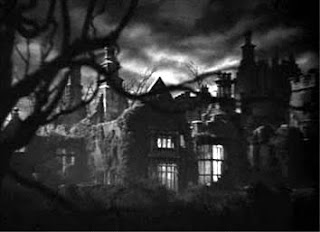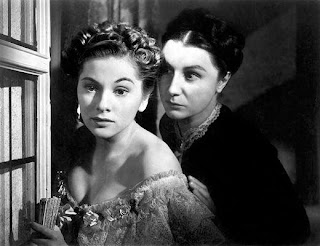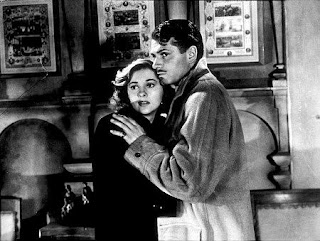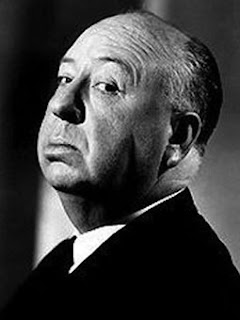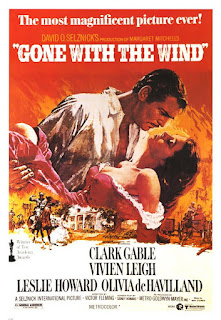"No, I don't think I will kiss you, although you need kissing, badly. That's what's wrong with you. You should be kissed and often, and by someone who knows how." --Rhett Butler to Scarlett O'Hara (
Gone with the Wind
)
I'm sitting in the dark as I write this, trying to ignore the heat that is winding its way through the windows and into my pours with such efficiency. The fan that I've positioned about a foot from my face just seems to be blowing more hot air, no matter that I've positioned a bowl of ice next to it as a kind of makeshift air conditioner. And even though I've put my sheets in the freezer, I still feel like I'm stranded in the desert, rather than in New England. I suppose it was smart of me then, to time this film with the first real heat wave of the summer. Watching Atlanta burn does seem to be making me feel a little better. And with that introduction, I give you...Gone with the Wind...
 |
| Scarlett at Tara |
The Plot
Irish born plantation owner Gerald O'Hara, played by
Thomas Mitchell, lives in Georgia with his wife Ellen and his three daughters, Suellen, Katie Scarlett, and Carreen. Scarlett, played by
Vivien Leigh, is the most beautiful and popular of all the young women in the county, though she is vain, spoiled, and in love with the one man she can't have, Ashley Wilkes, the only son of a neighboring plantation owner. Ashley, played by
Leslie Howard, is about to marry his cousin, Melanie Hamilton, played by
Olivia de Havilland. When Scarlett confesses her love, Ashley, though intoxicated by her beauty and spirit, chooses the sweet, even-tempered Melanie, knowing that they are much more compatible. Rhett Butler, a rogue with questionable morals played by
Clark Gable, witnesses Scarlett's tantrum and is immediately fascinated by her. But soon after, the Civil War breaks out and Scarlett marries Melanie's brother, Charles, out of spite just before all the men go off to war. Charles dies shortly after of measles, and Scarlett is widowed.
 |
| Scarlett at the Wilkes' picnic |
Bored and upset because she has to dress in black, Scarlett decides to visit Melanie and her Aunt Pittypat in Atlanta. Mammy, Scarlett's slave nursemaid played by
Hattie McDaniel, warns her to stay away from Ashley. In Atlanta, Scarlett shocks everyone by agreeing to dance with Rhett Butler, even though she is in mourning. Rhett visits her and buys her presents, but once Ashley returns, she has eyes only for him. Though Ashley can't turn her away he does make her promise to look after the now pregnant Melanie while he's gone. Soon, however, Scarlett's life turns from a high society social whirl to endless days of assisting Melanie to care for the wounded soldiers pouring in.
 |
| Scarlett dances with Rhett, though she's a widow. |
As the Yankees come closer to Atlanta, instead of fleeing with the rest of the city Scarlett must stay as Melanie prepares to give birth. Alone, Scarlett helps Melanie through a difficult birth before loading her, their slave, and Melanie's young son into a wagon, and fleeing the now burning city. She turns to the only man left, Rhett Butler, to get them safely out to her home, Tara. Rhett gets them close, and then leaves to join the war, though the South is losing. He confesses his love for Scarlett, and then kisses her despite her protests. Scarlett must fight through Yankees and mud before finally arriving home.
 |
| Scarlett hides from the Yankees. |
Tara has changed completely since Scarlett's last visit. Her mother has just died of typhoid fever, and both her sisters are still ill. The Yankees have stolen everything worth taking, and all the slaves except for Mammy and a few older slaves have gone. Her father has been driven mad with grief, and there is nothing for anyone to eat. Scarlett climbs to the top of a hill and manages to find a radish left in the dirt. She shovels it down, then collapses in despair. Dirty, tired, and hungry, Scarlett vows that "as God is my witness, they're not going to lick me. I'm going to live through this and when it's all over, I'll never be hungry again. No, nor any of my folk. If I have to lie, steal, cheat or kill. As God is my witness, I'll never be hungry again."
 |
| "As God is my witness, I'll never be hungry again." |
Under Scarlett's orders, everyone works together to pick cotton to sustain them, much to her sisters' chagrin. A Yankee tries to steal her mother's earrings, forcing Scarlett to shoot him and a bedridden Melanie to help her bury the body. Scarlett's father has lost his sanity, rides his horse dangerously, and falls and breaks his neck. Ashley returns home alive and is reunited with his family, though his home is destroyed and he must stay at Tara with Scarlett posing a constant distraction. They have many mouths to feed, including the homeless Confederate soldiers they've begun taking in. Taxes are piling up on Tara and Scarlett must find a way to save her home. She dresses in velvet green curtains, the only fabric left at Tara, and travels with Mammy back to Atlanta in search of Rhett, the only man she's known to consistently have money.
 |
| Ashley and Melanie |
Rhett is in genteel captivity, gambling with his captors and smuggling in luxury goods. Scarlett pretends to be the debutante she was, and Rhett pretends he has the money to help her, before both reveal themselves as frauds. Leaving the jail, Scarlett runs into Frank Kennedy, an older man and former soldier who hopes to marry her sister Suellen once his new convenience store makes enough money. Sensing he could save Tara, Scarlett steals him away from her sister and marries him herself. Scarlett convinces her new husband to pursue the lumber business, and Ashley to reluctantly join them. Under her ruthlessness, the lumber business thrives and Scarlett becomes wealthy again. But Scarlett's arrogance takes a turn when she is attacked while driving through a shanty town. Her husband and Ashley go to subdue the poor white people who attacked her without Scarlett's knowledge. But Frank ends up dead and Ashley injured, though he stays out of jail through Rhett's quick thinking.
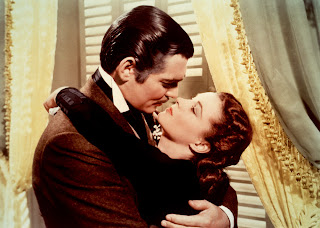 |
| Rhett convinces Scarlett to marry him. |
Filled with the new emotion of guilt, Scarlett gets drunk after the funeral. Rhett comes to visit and proposes marriage, and Scarlett accepts though she tells him she still loves Ashley. Rhett spoils Scarlett, giving her everything she ever wants, even restoring Tara to its former glory. But he cannot break her obsession with Ashley, and after their daughter Bonnie is born, Scarlett refuses him her bed so they she won't have any more children and lose her figure. Hurt, Rhett lavishes all his love and attention on Bonnie, and when Scarlett is caught in a compromising position with Ashley, he decides to take Bonnie away to Europe. It falls to Melanie to instantly forgive Scarlett and save her social standing. The night before he leaves, Rhett gets drunk and ravishes Scarlett, carrying her up the stairs.
 |
| Rhett and Scarlett |
Though Rhett spoils Bonnie, she still misses her mother. So he takes her home and immediately quarrels with Scarlett, who has missed them both but won't admit it. Scarlett does admit that she is pregnant, but the violence of her fight with Rhett causes her to fall down the staircase and lose the baby. Scarlett calls out to Rhett in her delirium, but he never knows, lost in his own guilt. Later, the two parents watch Bonnie ride her new pony. Scarlett, noticing the same heedlessness her father often displayed on a horse, asks Rhett to get her down. Suddenly Bonnie falls from the horse and breaks her neck.
 |
| Bonnie on her horse. |
Rhett is beside himself with grief, and Melanie comes to comfort him. She is pregnant as well, despite the doctor's orders that another pregnancy might kill her. While comforting Rhett and Scarlett, whom she has always stuck up for and treated as a sister, Melanie miscarries. Melanie lays dying in her home, and calls for Scarlett first. She tells her to look after her husband and son, as well as Rhett, who "loves her so." Scarlett comes out and cries in Ashley's arms, which is too much for Rhett, who leaves. Noticing the depth of Ashley's despair, Scarlett realizes that Ashley truly loved Melanie, and was simply too weak to turn Scarlett down. She realizes she loves Rhett and races back to tell him so. But Rhett can no longer believe it, and packs his bags to leave, despite Scarlett's declarations of love. When she asks what should she do if he leaves her, he utters the famous line, "Frankly, my dear, I don't give a damn." As Rhett walks off into the mist, Scarlett collapses on the stairs. Finally she looks up as a montage of different people speaking of Tara runs though her head and says the final lines of the film, "Tara! Home. I'll go home. And I'll think of some way to get him back. After all...tomorrow is another day."
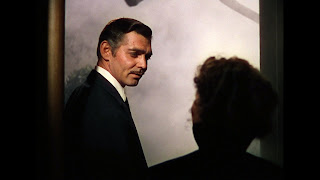 |
| Rhett leaves Scarlett. |
The History
Producer
David O. Selznick bought the rights to Margaret Mitchell's hit
novel of the same name only a month after it was published in 1936 for $50,000. Though the film would officially be produced by Selznick's own company, Selznick International Pictures, every major studio wanted to join forces until Selznick finally agreed to the terms set by his father-in-law, Louis B. Mayer. Mayer gave Selznick $1.25 million towards production costs along with the use of Clark Gable and in turn received exclusive distribution rights and 50% of the profits.
 |
| Burning of the Atlanta Depot |
It was three years before this film was finally released, and it would be subjected to a large variety of problems along the way, most of which occurred because of Selznick's determination to be in charge of every aspect. The script was never fully completed, and every writer that attempted a re-write had to contend with Selznick leaning over his shoulder making changes. While Gable eventually took the part of Rhett, it was with great reluctance and much negotiation. He agreed after being promised a $50,000 bonus which would enable him to divorce his current wife and marry
Carole Lombard. The "Search for Scarlett O'Hara" turned into a six month publicity stunt where nearly 1,400 actresses were interviewed before they finally settled on a relatively unknown British actress named Vivien Leigh. Leslie Howard insisted on wearing extra makeup and hairpieces, as he felt that he was far too old to play the part of Ashley Wilkes, who is 21 at the beginning of the film. The film also went through three directors:
George Cukor,
Victor Fleming, and
Sam Wood. Selznick's overbearing attitude led to the dismissal of George Cukor after only three weeks of shooting, though he had spent nearly 2 years in pre-production with Selznick. Cukor was replaced by Victor Fleming, whose macho attitude irritated many of the women on the set. Both Leigh and de Havilland would continue to receive private instruction from Cukor at their own request. But Selznick's micro-managing made Fleming have a nervous breakdown, causing another MGM director, Sam Wood, to fill in and finally assist Fleming with wrapping up the film. In addition Selznick also changed the cinematographer after a month because he felt the film was "too dark." And none of this includes the stack of daily memos he sent regarding costume, scenery, music, and lighting. The film cost $3.9 million to make, which included the $25,000 it cost to film the burning of the Atlanta Depot. The first scene to be shot, the raging fire was created by burning old MGM lots that needed to be taken down anyway. They used every one of the seven cameras in existence for technicolor at that time. The blaze was so intense that residents of Los Angeles jammed the phone lines, thinking that MGM was burning down. With all the problems, the movie industry began referring to the picture as "Selznick's Folly."
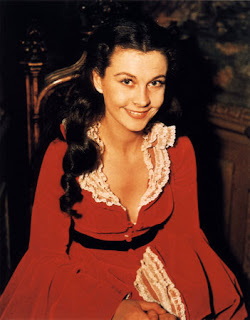 |
| Vivien Leigh as Scarlett O'Hara |
But
Gone with the Wind made good on its hype. With adjustments made for inflation,
Gone with the Wind is the still the highest grossing movie in North America according to
Box Office Mojo. It won 10 Academy Awards (2 of them honorary) a record that would stand for twenty years. According to
AFI's 1998 list of the 100 best American films, Gone with the Wind is #4 (though it dropped to #6 in 2007). Rhett's final line is also listed as
AFI's #1 best movie quote of all time. In order to preserve the line, the Motion Picture Association had to pass an amendment to the Production Code that forbade use of the words "hell" or "damn" a month before the film was released. They decided with much reluctance that those words would be allowed if their use "shall be essential and required for portrayal, in proper historical context, of any scene or dialogue based upon historical fact or folklore…or a quotation from a literary work, provided that no such use shall be permitted which is intrinsically objectionable or offends good taste." When it was released it was also the longest sound film ever made with a unprecedented 3 hours and 40 minutes in length (and a 15 minute intermission). The final script had been cut down from the original, which had been over 5 hours long.
 |
| Scarlett and Mammy |
Although the racial stereotyping of the film is often called into question, particularly the portrayal of a "mammy" character, Hattie McDaniel would be the first African-American to win an Academy Award (Supporting Actress). McDaniel was not allowed to attend the premiere in Atlanta because of segregation laws, however, and had to convince Gable to go anyway, though he wanted to decline in protest.
Butterfly McQueen's performance in particular as Prissy,a young slave girl, caused Malcom X to feel "like crawling under the rug." McQueen herself disliked the racial implications of the role though she said "Prissy should have been slapped often, because she was horrid!" And though modern audiences might wince at the stereotypes, Selznick worked hard to portray African-Americans in a positive light: "I have gone to extremes in the preparation and the casting of the picture, to avoid any derogatory representation of the Negroes as a race or as individuals and to eliminate the major things in the story which were apparently found offense by Negroes in the Margaret Mitchell book. I feel so keenly about what has happened to the Jews in the world that I cannot help but sympathize with the Negroes in their fears about material which they regard as insulting and damaging." Selznick therefore removed all mention of the Klu Klux Klan and the word "nigger" from the film's script, a small victory in 1939.
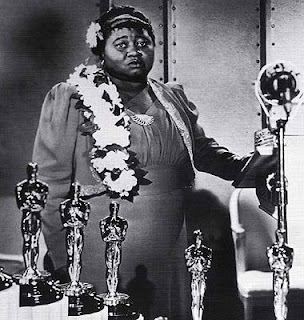 |
| Hattie McDaniel wins an Oscar. |
Any other year the awards might have gone to other great films like
The Wizard of Oz
,
Mr. Smith Goes to Washington
,
Wuthering Heights
or
Goodbye, Mr. Chips
. But this year
Gone with the Wind beat them all with hardly any effort. This awards ceremony would be the first to be filmed and shown later as a short film (directed by Frank Capra), causing many actresses to begin stressing over their wardrobes and jewels. Though the Academy made the press promise not to reveal the winners,
The Los Angeles Times still spilled the beans to several late comers, including Clark Gable and Bette Davis. The highlight of the night was clearly when Hattie McDaniel won her Oscar. Covered in gardenias, McDaniel received the loudest applause of the night and could barely make it through her studio prepared speech before running back to her seat, sobbing. Olivia de Havilland, disappointed by her loss in the same category ran into the kitchen and began crying as well. Irene Mayer Selznick followed her and told her to grow up, that she'd have plenty of other chances for an Oscar and to go congratulate her costar for what would surely be the biggest point of her career. Olivia de Havilland did just that, and remembered it as a significant "learning experience" of her life. Actress Fay Bainter said, when presenting the award, "This is more than an occasion. It is a tribute to an country where people are free to honor noteworthy achievements regardless of creed, race or color."
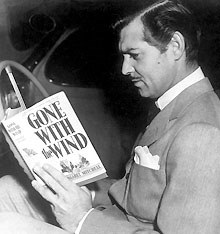 |
| Clark Gable reads Gone with the Wind. |
Gone with the Wind has inspired documentaries, themed weddings, novelty stores, parodies and even sequels. Today it is remembered as one of the best movies ever made and the film that defined the "epic" genre.
The Verdict?
How is it possible to review a film like
Gone with the Wind? Even writing this post was an epic task. This film is so much
more that I can't really get a grasp on how I feel about it. For me, it's not a film to be watched often. For one thing, it's extremely long. And it feels long. For another, this film doesn't have what I'd call a happy ending. Every time I watch it I become invested in the characters until I hit the last 45 minutes and everything falls apart. I warn myself that this is going to happen, and that I shouldn't get too involved. But I always let myself forget until...miscarriage, death, divorce...somehow all of this is more gut-wrenching than watching all the Confederate soldiers in Atlanta die from flesh wounds. Then again I am a Yankee.
 |
| Scarlet falls down the stairs. |
I want to say I dislike this movie. But I feel that like and dislike are words too tepid for this film. And it
is extraordinary. Every scene is filled with rich color, lavish sets, and incredible actors. Selznick does nothing on a small scale. Just as far as sheer production value, this must surely be the best movie ever made. Even the music is perfect, a sweeping score that helps to draw the viewer in even deeper. And all of the actors are incredible as well, particularly Vivien Leigh, who manages to make the audience like Scarlett and root for her even as she shows a complete disregard for the feelings of others. Of course my favorite character is Mammy, who is the only person in this movie who knows what the hell is going on and has the temerity to comment on it. When she likens her beloved Scarlett to a spider lying in wait for Ashley (to her face)...well...that might be my second favorite line.
 |
| Scarlett visits Rhett dressed in drapes. |
Despite all of that, this movie doesn't rank as one of my top favorites, only because of the fact that I end the movie screaming and throwing things at Scarlett. It's uncomfortable. And I hate cliff hangers. But like Rhett to Scarlett, I can't help being drawn to this film, even if I know that it's bad for me. I'm sure five years from now I'll get tricked into watching it again, and I'll go through the same emotional reaction. But there's something about this movie that keeps me coming back to it. Something grand and wonderful. And then there's my favorite line of the movie, the one that I've put above. Just for Clark Gable delivering that line will I watch this movie over and over again. I'll just skip through the scenes with Prissy. Her voice is like nails on a chalkboard.
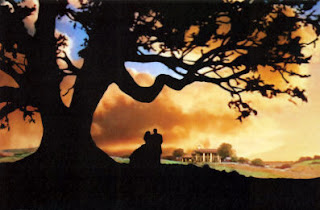 |
|
My final verdict? Watch it. One day when you're bored and you have nothing else going on. Sit for four hours and watch one of best movies of all time. And while every moment is worth it, don't expect you'll be going back to Tara anytime soon.




